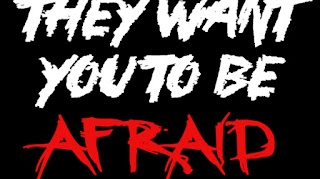MY NEW FILM "CANAAN LAND" WILL EXPOSE THE SPIRIT OF RELIGIOUS FEAR
Evangelical, Pentecostal, Charismatic, and Fundamentalist church culture is gripped by a spirit of fear. The Bible itself says, "God has not given us a spirit of fear, but of power, love and a sound mind...perfect love casts out fear, the one who fears judgement has not matured in understanding God's love." Most folks in this movement, though they would deny it, are very fearful. Fearful of being left behind, apocalypse, the devil, etc.. Why do preachers do it? Fear sells. Fear is primal and gets attention.
Psychologically, it's damaging long-term to be immersed in fear, but very very effective to get attention and motivate. There are always calamities that can be used though to reinforce fear. Preachers have always used it, be it the atrocities of Civil War in 1800's, Hitler's rise in WW2, (most evangelicals said he was the antichrist at the time).
I've found as people get away from fear-based church stuff, they get healthier spiritually, mentally, psychologically. But I understand why people are in that place of fear. There are different levels of spiritual growth. Lower levels are very fear based. Much of the evangelicals world is there and may never grow beyond that. That's where they are. I was there at one time, but have come to a much healthier place of greater peace. "Thou wilt keep him in perfect peace, whose mind is stayed on Thee," Isaiah wrote. I am very grateful to be free. However, if I ingested this type of teaching consistently and constantly i could have the fear come back moreso.
I hope and pray I can do a great job making my next movie "Canaan Land" to contrast fear and love, a faith that heals versus a faith that hurts. True religion that cares for the orphans and the widows and the needy versus manipulative fear-mongering designed to get bigger offerings and built bigger megachurches.
Visit the new just-launched Facebook page for the film here: http://www.facebook.com/canaanlandmovie
Psychologically, it's damaging long-term to be immersed in fear, but very very effective to get attention and motivate. There are always calamities that can be used though to reinforce fear. Preachers have always used it, be it the atrocities of Civil War in 1800's, Hitler's rise in WW2, (most evangelicals said he was the antichrist at the time).
I've found as people get away from fear-based church stuff, they get healthier spiritually, mentally, psychologically. But I understand why people are in that place of fear. There are different levels of spiritual growth. Lower levels are very fear based. Much of the evangelicals world is there and may never grow beyond that. That's where they are. I was there at one time, but have come to a much healthier place of greater peace. "Thou wilt keep him in perfect peace, whose mind is stayed on Thee," Isaiah wrote. I am very grateful to be free. However, if I ingested this type of teaching consistently and constantly i could have the fear come back moreso.
I hope and pray I can do a great job making my next movie "Canaan Land" to contrast fear and love, a faith that heals versus a faith that hurts. True religion that cares for the orphans and the widows and the needy versus manipulative fear-mongering designed to get bigger offerings and built bigger megachurches.
Visit the new just-launched Facebook page for the film here: http://www.facebook.com/canaanlandmovie



